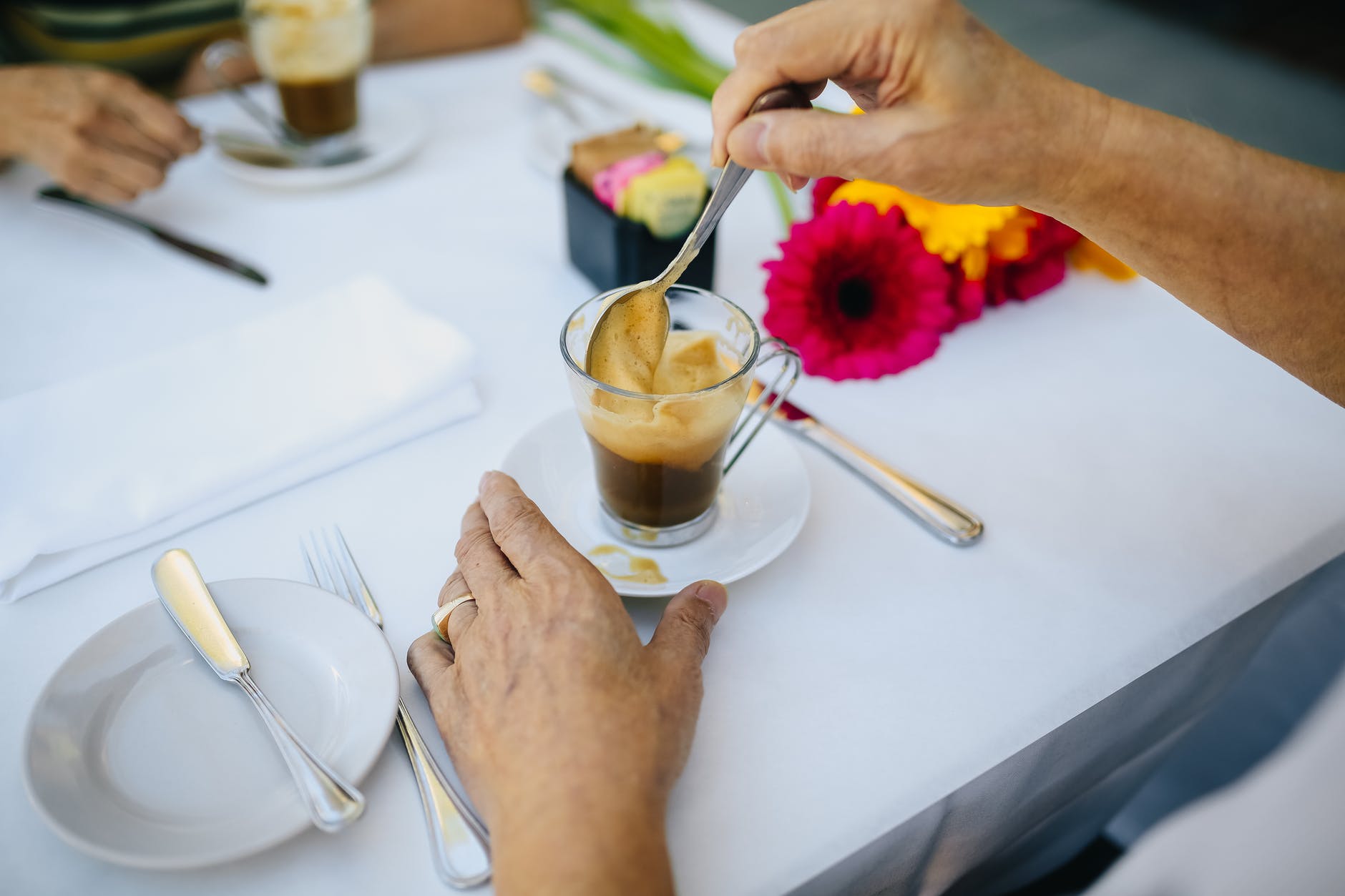Have you been spending a ton of time cooking (or learning how to cook) during the pandemic and the quarantine?
You’re definitely not alone on that one!
And we have a treat for you today!
Chefs on AskReddit offered up cooking tips that will help all of us out. Let’s take a look.
1. Watch the temp.
“Watch your cooking temperature! You don’t need everything blazing hot. In fact, with high heat you’ll usually end up burning/drying out your meal. Medium heat is your friend. It gives you more time to get it right.
A simple example is a good grilled cheese sandwich. If you make it in a skillet on medium heat, it might take a while. BUT you’ll have enough time to make sure the toast is perfectly crispy without getting burned.”
2. Take it all in…
“Learn how to hold a knife and cut correctly.
Use acid – it’s your friend! Lemon juice, vinegar, microplaned zest, whatever. It brightens up everything.
Season every step of the way and taste as you go. Don’t overdue it, obviously, but you want to season every layer and taste.
Keep in mind that acid will then also amplify things like salt – keep everything in balance.
Someone else said it, but it’s true – it’s easier to add than to take away.
And if you’re making something like soup or stock or sauce – if it’s something that will reduce down season lightly as you make it, and then when it’s finished season at the end to get it where you want it.
If you haven’t noticed, a lot of mine are about seasoning. The vast majority of home cooks (and even some restaurant dishes) are under seasoned. Sometimes all you need are salt and pepper, but most people don’t use enough – salt especially. It shouldn’t taste SALTY, but just shy of it.”
3. I love risotto.
“When you make risotto, add the rice to the pan and cook it on very low heat until the edges turn slightly translucent before adding any liquid.
Your risotto will be much more tender and evenly cooked”
4. Roast ’em up.
“You can roast almost all veggies and they turn out delicious. It’s also really easy.
Take the veggie, cut it into bite sized pieces give or take (can be larger if you want, just adjust cooking time and test for tenderness). Place in a bowl and toss with olive oil until everything is lightly coated. Spread out on a baking sheet (can put a layer of parchment paper on it to make clean up easier) and season with a thin layer of kosher salt and pepper on all pieces.
Place in an oven at 350F or above and once well browned, remove and eat. You can roast at 450F if you want but just know that it will take less time at this temp and more time at lower temps. Do it a lot and you’ll gain experience and figure out what temps you like. For me, it often depends on what else is in the oven and I just go with it and check it periodically.
If you want to kick it up a little, sprinkle some diced garlic and some red pepper flakes (go light if you’re sensitive to spice) over the veggies as well. Cook the same. They are delicious.
Works with almost everything – broccoli, brussels sprouts, cauliflower, carrots, all squashes, etc.”
5. Listen up!
“Too much salt in a soup? Add potatoes. Potatoes soak up salt like mad, I swear.
Whole roasted chicken will make two meals, plus create stock. First will be roasted chicken. Second will be chicken soup. Finally, boil bones to make stock.
Don’t be afraid of acid, like vinegars, citrus, pickled items. Fermented things as well. Add more jarred olives to your recipes, they will expand flavors.
Red wine is required for the best beef dishes.”
6. That’s all you need.
“Kosher salt, cracked black pepper, olive oil, garlic, lemon, butter.
That’s all you need to season anything. Any protein, any roasted veggie, any salad- keep it simple.
Also, a working meat thermometer will never let you down. Take the guesswork out.”
7. Now I’m hungry.
“Flour and fat makes a roux. Roux makes sauces thick.
You want a white country gravy? Put equal amounts oil and flour in a pan. Cook over medium heat while stirring until flour turns a little brown. Pour milk and whisk together. Crack black pepper. Reduce. Done.
You want thick sauce with some chicken or meat? Sear the meat and set aside. Sauté your vegetables in oil or butter. Sprinkle flour on it until it soaks up the oil. Stir it until it browns the flour a little. Pour in broth or milk for a sauce. Put meat back in to finish in the sauce.
Creamed spinach? Add oil to pan. Sprinkle with a little flour and a dash of nutmeg and pepper. Cook couple minutes just to get rawness of flour gone. Add milk and reduce to desired consistency. In separate pan sauté finely minced onion in butter and EVOO. Add garlic until fragrant. Wilt spinach. Mix together when they are both to your liking.
You want gumbo? Add flour and oil to big pot. Stir constantly until it gets dark (about milk chocolate color). Collect the roux. Sauté vegetables. Add roux and broth. Add chicken and sausage.
Seafood gumbo? You cook the roux until peanut butter color instead of super dark. Sauté veg. Add roux and broth. Add crawfish, shrimp, and blue crab.”
8. Good info for you.
“- Prepare ingredients before cooking them. This means get spices, seasonings and condiments ready to hand before you cook anything, and chop up everything you need.
Some recipes can be more forgiving and you can chop stuff while something’s cooking, but other dishes have a quick cooking time, and it can get chaotic if you’re trying to find a certain spice while your food is getting burnt.
– Clean as you go. One thing I hate about cooking is cleaning up after, but I try to clean every item that I use as soon as I’m done with it, so that there isn’t a mountain of cleaning up afterwards. I’ve lived with people who do not do this, and they put off the washing up because there is so much to do.
– Learn from mistakes. I have a few staple recipes that I can do pretty well, but I have f*cked up cooking on many occasions (even the stuff I usually get right), and have made stuff that I would throw away if I didn’t care about food waste and wasn’t hungry.
That being said, I try to figure out where I went wrong while I’m eating, and either look for a different recipe, or retrace my steps on the method to see what I could do better.”
9. Makes sense.
“If it grows together it goes together.
Want a tropical-tasting dish? Find a fish that lives in tropical climates and add tropical fruits. Want something Italian? Roma tomatoes, oregano, Italian parsley, they all come from the same region.
Of course, you can add things from other climates, but it’s a simple rule to follow.”
10. From a veteran.
“Things I would add to the list of tips given my time running restaurants:
Build a pantry of ingredients you can use…this includes dried spices/herbs, different vinegars, maybe a fancy(finishing) salt and regular salt. You won’t use them all every meal, but it’s good to have a bunch of stuff to work with. Think of a good mechanic. They have toolboxes full of various tools for any problem they may come across. This is the same for cooking.
Grab some small bowls…these will be your mise en place bowls. Prep your stuff out, place them in bowls and then use them as you need. There’s a reason you see cooking shows have all of their ingredients in bowls. It’s easier to NOT scramble around trying to chop up some veggies while trying to not burn the onions you put in the pan. Make sense?
Taste. Taste. Taste. Taste. Always taste the food. Somebody mentioned how different garlic tastes depends on when you add it to the process. That is absolutely true about EVERYTHING. Always taste as you add stuff and cook longer.
Don’t buy substitutes. They’re generally all trash. Get the regular butter. Get the regular mayo. Avoid “olive oil added!” For “health reasons”. They’re generally full of more crap and additives than the regular version. “Low fat” or “reduced calories” are the in the same boat. This is a broad stroke comment – for those with medical issues this may not apply. Everybody is different.
Keep trying stuff out. Try the same dish multiple times. Don’t get too hard on yourself. I’ve been doing this for 12 years and STILL cook some crappy meals or come up with dish ideas that just kind of suck. It’s going to happen. It’s not a 100% success rate with good food. You’re going to f*ck up dinner a few times. We’ve all done it. We’re going to do it again. It’s a craft. It takes time.
Hope these tips help! Keep cooking. Don’t stop. Make some funky meals. -From a chef de cuisine from Chicago.”
11. Practical advice.
“Keep a waste container.
As you chop stuff, put waste in the container. When you’re done, toss the waste in the garbage (or save vegetable scraps for stock).
No running to the garbage every second and no mixing of waste and your food.”
Do you have any great cooking advice you’d like to share with us?
If so, please talk to us in the comments.
Thanks in advance!
The post Chefs Offer Cooking Tips They Think All of us Should Know appeared first on UberFacts.
pic.twitter.com/1jE6mnSelI
RT @curryspic3: a friend and I were in a public washroom at a bar last night and she said “shit I want to text my ex” and 3 different girls in the bathroom stalls screamed out “don’t fucking text your ex”
(@DylanParkerNash) May 10, 2019
I am crying pic.twitter.com/JvY62dJBLn


















 (@laliyson)
(@laliyson)  (@shakesqueerean)
(@shakesqueerean) 

 (@NorskEmily)
(@NorskEmily)  (@CdyRnkn)
(@CdyRnkn) 
 (@CannoliCamo)
(@CannoliCamo) 












 (@smartyy)
(@smartyy) 
 LAURA
LAURA 
 And another few bucket list items to tick off
And another few bucket list items to tick off  #bikepacking #thisisscotland #outerhebrides #wildcamping #whitebeaches #standingstones #sspolitician #whiskygaloremovie #highlandsandislands #islandhopping #calmac
#bikepacking #thisisscotland #outerhebrides #wildcamping #whitebeaches #standingstones #sspolitician #whiskygaloremovie #highlandsandislands #islandhopping #calmac . . . . #whiskygalore #whisky #whiskylover #lovewhisky #singlemalt #lovescotland #eriskay #outerhebrides #sspolitician #visitouterhebrides #scottishculture #hebrides #visitscotland #whiskyphotography #productphotography #nikonphotography #nikonpro #commercialphotography #thisisscotland #advertisingphotography #elexiroflife #angelsshare #cultfilm #scottishfilm
. . . . #whiskygalore #whisky #whiskylover #lovewhisky #singlemalt #lovescotland #eriskay #outerhebrides #sspolitician #visitouterhebrides #scottishculture #hebrides #visitscotland #whiskyphotography #productphotography #nikonphotography #nikonpro #commercialphotography #thisisscotland #advertisingphotography #elexiroflife #angelsshare #cultfilm #scottishfilm